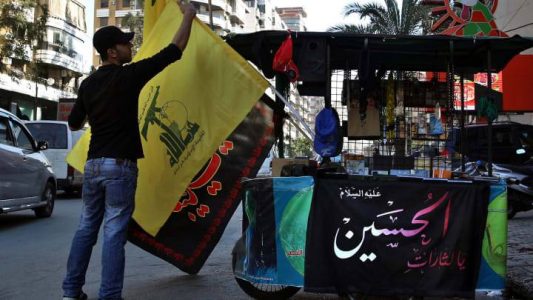
Lebanon pays the price for a burden called Hezbollah
Shortly before the Israeli attacks on Hezbollah, the U.S. Treasury Department announced it was levying economic sanctions against Lebanon’s Jammal Trust Bank.
In this case, the term “sanctions” does not elucidate the extent of absolute damage this will cause the bank. The American administration demanded of Lebanon that it close the bank, freeze its deposits and prevent it from paying any debts.
The governor of Lebanon’s central bank, Riad Salameh, quickly moved to carry out the order. He announced a freeze on the bank’s operations and handed over accounts management to the central bank until a solution could be found.
Salameh made an assurance that “all legitimate deposits compliant with Lebanese laws and the Central Bank’s circulars are insured upon maturity.” In other words, his representatives would have to confirm with the U.S. Treasury Department which account owners are legitimate and which aren’t, thus allowing the American administration unprecedented access to the Lebanese financial institution.
Besides a general statement that Jammal supports Hezbollah’s “illicit financial and banking activities,” the United States did not detail the suspicions, listed no amounts or dates or who was behind such “illicit” activities.
Anwar al-Jammal, owner of the bank that employs 400 people in over two dozen branches across Lebanon and dozens of other representatives worldwide, apparently didn’t understand why exactly the American administration decided to target his bank. Jammal drew praise last year for close cooperation between the bank and USAID and for its “Save and Win” campaign to encourage Lebanese citizens to increase savings. Lebanese economists say that Jammal is not a political man and not the type to conduct relations with Hezbollah. They say it was probably the bank officers who helped Hezbollah without knowledge of senior management, and that there was no justification for punishing all employees and certainly not the deposit owners who are now unsure of the fate of their money because they can’t verify whether they are on a blacklist.
Jammal Bank Trust isn’t Lebanon’s biggest bank, and the immediate repercussions of it closing won’t influence the extent of the current economic crisis. Lebanon’s national debt is around 150 percent of its gross national product and its foreign currency reserves are $31 billion, but designated to serve as a guarantee for repaying debts. Lebanon has a window of opportunity is gas drilling in the Mediterranean, but before it can do that, it needs an agreement to mark its economic borders with Israel. However, the bank’s closure – despite promise by U.S. Treasury Department last year that it did not intend to hurt banks in Lebanon – makes clear the economic burden Hezbollah is placing on the Lebanese government.
The Lebanese government has waited over a year to implement the decisions of the Cedar conference for international donors, which pledged to provide it with loans and grants worth $11 billion. The problem is that donor nations are withholding the funds as long as Hezbollah members serve in government ministries. It is an enormous sum designated to support development projects and to create additional revenue for the government. Lebanese President Michel Aoun has twice convened cabinet members and economic experts to try and build an economic plan that could convince donors that there is a way out of this crisis, but no practical decisions have been made.
Meanwhile, the banks are working together with the central bank to calm the local market and to create a sense of safety among account holders. For example, banks are offering 15 percent interest on deposits in Lebanese pounds. The banks then deposit the funds with the central bank, which pays them 21 percent.
Small-account owners, who are pleased with this arrangement, are not aware that the central bank’s ability to pay the banks the high interest rate is liable to dissipate in the not-too-distant future. There is concern that the bank will be forced at a certain point to end this policy, to declare a cut in payments to banks, to place limits on foreign currency purchases and thereby to cause a massive flow of currency out of the country or the bankruptcy of hundreds of thousands of account holders.
Hezbollah is not part of this game because its funds are not managed by Lebanese banks. A widespread banking crisis may lead to a situation in which the group targeted by the international sanctions will actually be the one to emerge with the greatest economic means, allowing it to acquire additional assets at basement prices on top of the billions of dollars in assets it already holds.
Hezbollah may support the idea of the Lebanese government receiving international aid, part of which would end up in the ministries it controls, but it doesn’t need these funds for its operations. As long as it doesn’t rely on supervises banking pipelines, Hezbollah is inure to an economic crisis in Lebanon.
Source: Haaretz





